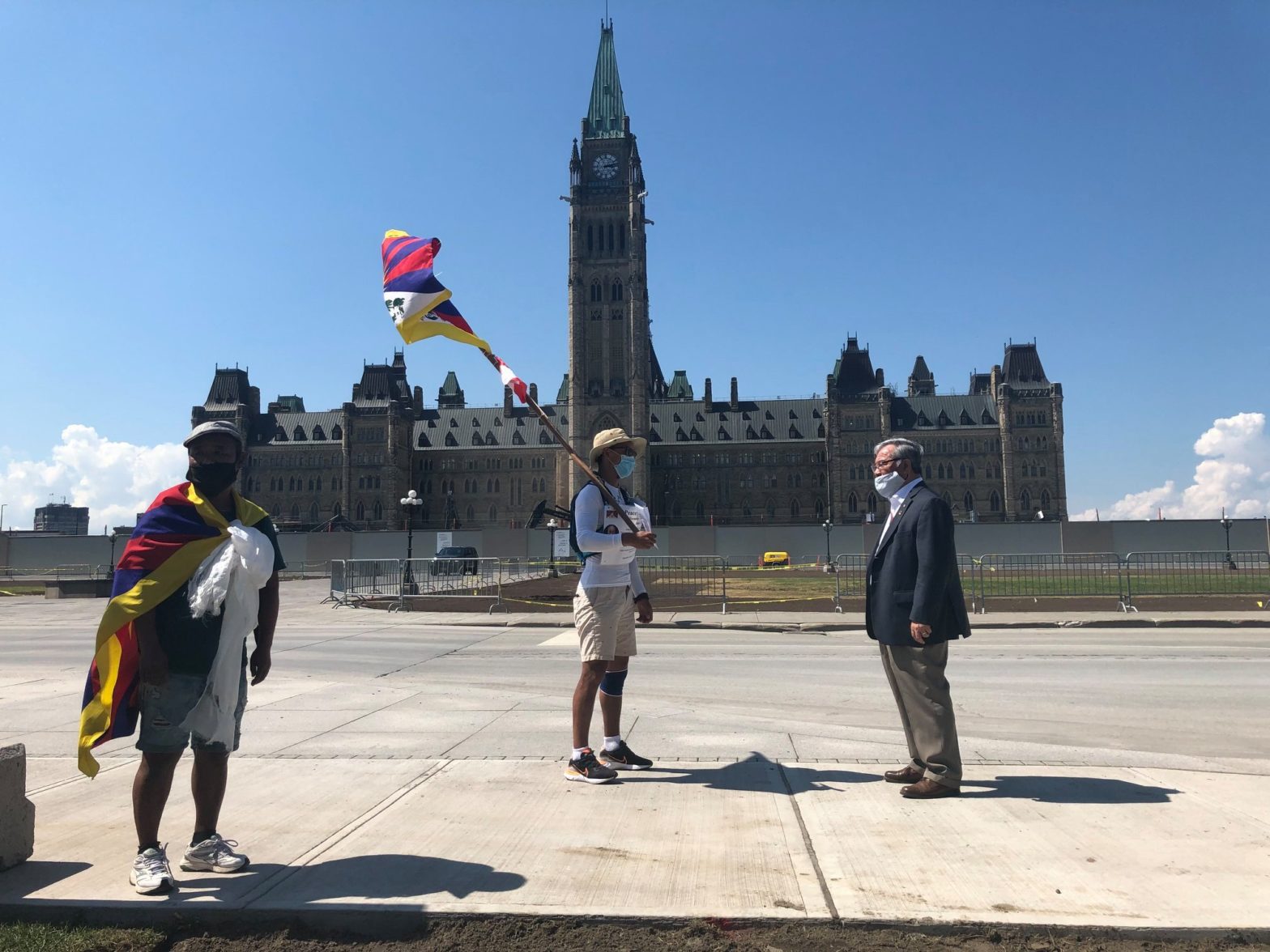July 20, 2020, Ottawa – Sangyal Kyab decided to embark on a round trip peace walk from Toronto to Ottawa after he had been protesting every Wednesday outside the Chinese consulate for the last two years and realized it didn’t affect what he felt was the lack of interest and attention from Canadians towards the situation in Tibet.
Sangyal didn’t know what to do about that sense of apathy initially. What he knew was that he had a primal urge to get closer to the capital city where business interests and top advisors met and maintained the status quo on China. So on June 28, a Sunday morning, Sangyal Kyab began a peace walk to Ottawa.
He set off on his peace walk with three demands: (1) support the return of His Holiness the Dalai Lama to Tibet, (2) renew Sino-Tibetan dialogue in good faith, and (3) release Panchen Lama, Tashi Wangchuk and other political prisoners in Tibet. His demands are based on the core issues of the Tibetan movement. Tibetan spiritual leader His Holiness the 14th Dalai Lama, who had his 85th birthday this week on July 6th, hasn’t been to his homeland Tibet since coming to exile in 1959. China, in recent years, has started claiming the right to appoint the next Dalai Lama despite facing strong criticisms from the international community for their interferences in Tibetan Buddhist traditions.
Since China’s illegal invasion of Tibet in 1950, Tibetans inside Tibet have lived under a police state that regularly and violently suppresses freedoms on every spectrum to maintain their colonial rule. In the last four years, Freedom House has consistently ranked Tibet as the second least free country in the world, trailing only Syria. This means that for Tibetans inside Tibet, we are less free than repressive countries such as Eritrea, South Sudan or North Korea.
In the last decade, 155 Tibetans have resorted to setting themselves on fire to protest against the Chinese rule and the systemic violation of Tibetan human rights, including the right to self-expression. The self-immolation protesters include nuns and monks, but many were ordinary laypeople: nomads, peasants, students, teachers, vendors, a carpenter, a woodworker, a writer, a painter, a taxi driver, a retired government cadre and a laundry owner. Although these protesters came from different walks of life, they were all unified in their final exhortations as Tibetans in Chinese-occupied Tibet.
A large number of these protests took place in Amdo, Ngaba, or ‘Ngawa county of Sichuan Province’ in colonial Chinese demarcation. Sangyal Kyab was born in this place, and so were his parents who still reside there today. When Sangyal was 14, his parents arranged his escape from Tibet with the hopes that their son would be able to live a free and fulfilling life in exile.
Sangyal still has vivid memories of his home in Ngaba and his childhood. He recalls being seven or eight years old and visiting his father (or Apa, as Amdowas lovingly address their father) in prison. His Apa, Cochu Kyab, was a community organizer and a political prisoner who served 14 years in Chinese prison. For the young Sangyal, his Apa’s lengthy absence in the household served as a glaring reminder of what the Chinese regime had stolen from him and his family. In a 2017 phone conversation with his father, the elder Kyab discussed his son’s privilege as a Canadian citizen and his rights that are protected by the country’s principles of liberal democracy. He advised his son to partake in peaceful activism in Canada and lobby for tangible support for Tibet.
In the Canadian political landscape, Canada-China relations is currently undergoing an existential crisis. Public opinion on China has swung dramatically, and an Angus poll found that four out of five Canadians want Huawei banned from our 5G network and 76% say Canada should prioritize human rights and rule of law over economic opportunity. As Canada reevaluates its relationship with the authoritarian regime, Tibetans want Tibet to be included in that discussion, beyond just a mere footnote. Sangyal Kyab believes you could perhaps start by supporting his demands for the Tibet cause.

